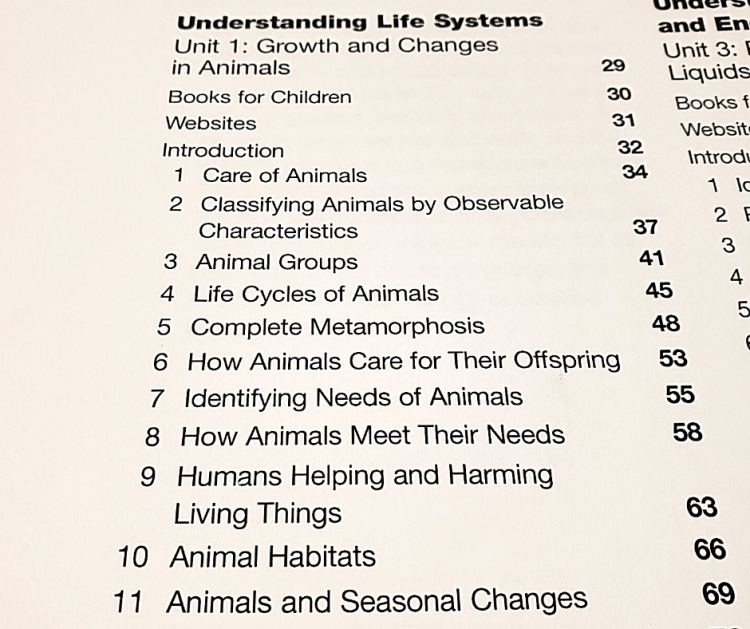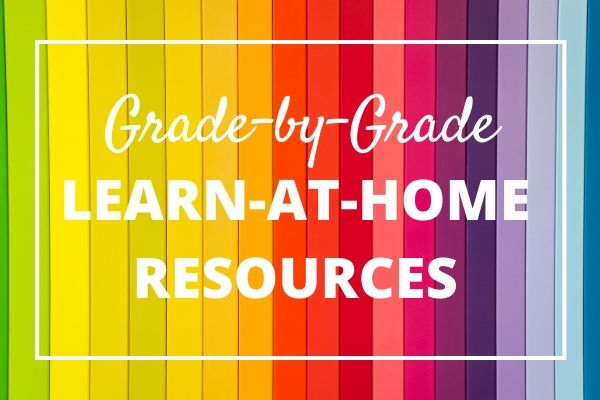If you are planning to homeschool just for a year, you might want to be looking for curriculum or resources that help you stay as close to their public schooled peers as possible. Typically, homeschoolers diverge from the path, enjoying the opportunity for freedom in their educational journey. But if you only need to homeschool for a year, the need to stay on par is a common goal. So, how do you plan this kind of homeschool year?

(If you are planning to homeschool for longer or want a more in-depth look at how to plan your homeschool year, try the Ultimate Guide to Planning Your Homeschool Year.)
STEP ONE: WHAT SUBJECTS?
The first thing you need to do is figure out what subjects are being taught at your child’s grade level.
Some ways to do that:
- Every province and territory in Canada has a set of curriculum expectations and outcomes for each grade. Find the one that matches the grade you are looking for and take a look at each subject studied, the topics included, and milestones expected. Don’t focus on all the “Extra” words or teacher jargon – instead look for the general topics and ideas.
- Visit the Learn-At-Home Plans section on my website. I put together grade by grade lists of topics and potential resources you can use after filtering through the government learning outcomes for each province. Although it isn’t an exact match for every single topic, it’s pretty close.
- Use one of my Curriculum Checklists. Right now, you can find Grade 1-8 for Ontario, Alberta, British Columbia and Saskatchewan. More are coming.
- Use Table of Contents. There are some great resources out there which cover the basic topics needed for the year. You can look for ones that focus on the grade you are going to be studying at, and then pull the information from it to make a plan. For example, the Complete Canadian Curriculum books that you can find from stores such as Costco and Chapters. These books might not be a full year’s curriculum by themselves, but can offer some valuable insight into what to teach for each grade (and be a great jumping point for learning.) Another is the Hands-On series from Portage & Main Press. (Download the samples for your child’s grade.) Take a look at what is covered in the Table of Contents. These will give you a lesson plan outline quickly and easily – even if you don’t use either resource in the end.
Write down the main subjects and topics covered for the year. This is your general plan going forward.
STEP TWO: RESOURCES FOR LEARNING CORE SUBJECTS
At this point, you know what to cover this year but need to figure out what to use to teach / learn.
The DIY Approach
This is where my favourite technique of looking at table of contents comes in. Resources that have been created already have your entire lesson plan laid out for you. Let me show you an example using the Grade 2 Hands-On Science & Technology book from Portage & Main Press.

There are 11 lessons covered in this unity of Growth and Changes in Animals. If I didn’t have a copy of this book, I could look at the website and download the sample to look at the table of contents.
So, for lesson one, “Care of Animals,” I could then go find a video about taking care of animals, some books about taking care of animals, a worksheet about it, a hands-on activity (like getting a fish or having my child be responsible to do all the care of the family pet for the week, or setting up a play zone with pretend pets, etc).
For lesson two, “Classifying Animals By Observable Characteristics” I could find a computer sorting game, we could pull all the stuffed animals out of the pile and talk about the characteristics they see and sort them into piles (ie. four legs or 6 legs, big or small, flies or swims, etc).
In lesson three, we could watch a video about different animal groups (such as a Wild Kratts episode) and start to understand more about the different classification groups: Amphibians, Mammals, Fish, etc. then we could cut animals out of magazines and make collages of different animal groups.
And so on.
All you have to do is take the topics and pull a plan together. It doesn’t need to be complicated.
The Curriculum / Resources Approach
You don’t have to plan it yourself if you don’t want to. You can buy or find resources based on each topic and have it all ready set and planned. This can save time and effort – especially if you aren’t feeling confident in yourself.
My advice is to be careful not to spend lots of money on resources, especially if you are planning to only do this for a year and put your child back into the school system the next. Look for things that are “good enough.” They don’t have to explicitly match every milestone set out by the government for your child’s grade, but at least offer learning opportunities.
Here are some ideas for resources that might work for you:
Math:
- Jump Math (which you can get from Amazon : https://amzn.to/30jFhOf – affiliate link) or from the Learning House (Canada)
- Math Mammoth: https://www.mathmammoth.com/international/international.php
- Teaching Textbooks: http://teachingtextbooks.com/
- MathSmart : Available at stores like Costco or Chapters or the company website : https://www.popularbook.ca/products/subject/math
Language:
- EnglishSmart: Available at stores like Costco or Chapters or the company website: https://www.popularbook.ca/products/subject/english – these are good enough for the year although they can be a little dry.
- Reading – encourage your child to read (or read aloud together). Have discussions about the books and/or do a book report or presentation / craft at the end.
- Spelling – review words from the books you are reading or from the other topics you are studying (or – honestly, don’t worry about it)
- Grammar – Try something like daily grammar : http://www.dailygrammar.com/archive.html or a resource such as Easy Grammar available at most homeschool curriculum stores.
- Writing – encourage journal writing for free writing.
Science:
- ScienceSmart: Available at stores like Costco or Chapters or the company website: https://www.popularbook.ca/products/subject/science-subject – these are good enough for the year although they can be a little dry.
- Hands-On Science: From Portage & Main Press. Although these are really intended for classrooms, the lessons are generally adaptable to homeschool. Includes photocopiable worksheets, activities, and ideas for books, etc. Available for Ontario for Grades 1-6, British Columbia for K-5, and Manitoba for Grades 1-7.
- GenerationGenius: An online videos / lesson program. Find out more here: https://www.generationgenius.com/
Social Studies:
- Donna Ward: Canadian Geography and History resources. https://donnaward.ca/
- The Canadian Homeschooler Shop: History and Geography resources. https://shop.thecanadianhomeschooler.com/shop/
STEP THREE: OTHER SUBJECTS
If you decide that this year, you aren’t going to worry too much about French or Music or Art – it will be okay! A year off from doing extra activities isn’t going to ruin anything. Drop anything that is giving you stress or making you nervous. However, some people love to or want to include these subjects and that’s okay too. Do what works for your child and family!
French:
This subject can feel challenging to teach / learn if you as a parent aren’t confident in your French language skills. Some ideas:
- Take an online French class – there are many popping up this year to help fill this need.
- Watch YouTube videos from French teachers
- Play games or use apps like Duolingo
- Get French Audiobooks
Music:
- A simple way to include music is to throw some different kinds of music on in the background during school or meal times. Or have a quality listening time where you lay on the floor and listen to a piece of music with intention and talk about what they heard / felt during the piece.
- Take some free guitar lessons from JustinGuitar or piano lessons from Hoffman Academy.
- Check out the free lessons and listen to classical music at Classics for Kids
Art:
- Join an Art Lesson Membership like KinderArt
- Take YouTube Lessons (Kids Art Hub is fun)
- Follow learning plans from ArtTango.com (Grades 1-5)
The main idea is to offer some learning opportunities this year. If you choose to homeschool, most provinces don’t require you to follow the outcomes exactly. You have freedom to choose how and what you would like to do. Admittedly, if this is only a short-term plan, the idea of trying to continue some level of consistency with the school plan of their peers is comfortable and understandable. Just make sure that you don’t burn yourself out trying to do school at home. Try to enjoy the time with your child.
- How to Keep a Toddler Busy While Homeschooling - March 21, 2024
- 25+ Things Your Kids Learn From Video Games - March 20, 2024
- 10 Words For New Homeschoolers - March 20, 2024

